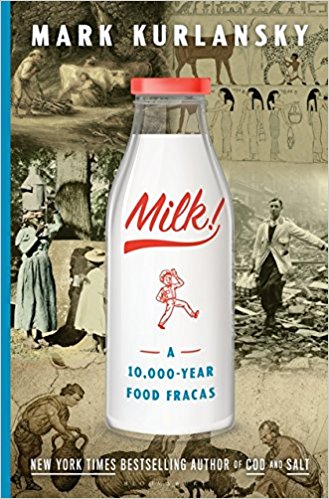You have /5 articles left.
Sign up for a free account or log in.
 Milk!: A 10,000-Year Food Fracas by Mark Kurlansky
Milk!: A 10,000-Year Food Fracas by Mark Kurlansky
Published in May of 2018.
There are those amongst us that are guaranteed readers of Mark Kurlansky’s latest book Milk!: A 10,000-Year Food Fracas. We have read and loved all of Kurlansky’s previous deep dives into the history, biology, economics, politics, genetics, and literature of specific foods.
Amongst the Kurlansky classics include books on Salt, Oysters, and Cod. In fact, it is Cod that really kicked of the genre of the historical food biography.
Other books that teach us about how the world works and has changed through the lens of a single food include: chicken, the potato, spices, tomatoes, bananas, and booze. What single food history books am I missing?
Reaktion Books has an entire book series called Edible dedicated to monograph long treatments of the histories of individual foods. Included in the series are books on nuts, pancakes, herbs, sausages, berries, chillies, mushrooms, cocktails, pie, soup, spices, cheese, barbecue, offal, brandy, champagne, caviar, rum, dumplings, pizza, vodka, cake, herring, doughnuts, oranges, apples, onions and garlic, corn, moonshine, whiskey, hot dogs, shrimp, olives, game, honey, melons, rice, water, wine, salmon, coffee, chocolate, cabbage, dates, edible flowers, truffles, pineapples, seaweed, fats, bananas, beef, pudding, pork, bread, tea, curry, pasta and noodles, hamburger, potatoes, sugar, beer, gin, lemon, pomegranate, figs, sauces, oyster, eggs, lobster, milk, salad, ice cream, tequila, the sandwich, and lamb.
Alas, none of these books are in audiobook format, so you will have to tell me if the Edible series is any good.
Which all brings us back to Kurlansky’s history of milk - Milk!.
As you may have guessed, I really like books that explain big things through narrow lenses. It may be a stretch to say that by understanding the history of milk that one can understand the history of the world, but maybe not that much of a stretch.
As Kurlansky shows throughout Milk!, the story of dairy is really the story of civilization. We have been milking animals for as long as we have been domesticating animals. The production, distribution, and consumption of milk, cheese, yogurt, and ice cream has been a central part of the diet and the economy of every society.
Milk! spends a good deal of time on the dairy industry, and the milk products that are produced from cows. Dairy from cows, however, is only part of the larger milk story. In Milk! we learn about the variety of animals that historically and currently provide dairy to a range of civilizations, from the yak in Tibet to the camel in Arabia.
From reading Milk! I learned much about the modern dairy industry. Forget the romantic image of small farms, as milk production is as much a part of the industrial food landscape as any other commodity. The descriptions of the growing organic milk industry are fascinating - and cautionary for anyone thinking about quitting their information-age jobs to start a dairy.
I also had no idea that I knew so little about how milk got from the cow to my fridge, or how cheese is actually made.
This being a Kurlansky book, there are lots and lots of recipes. The reading of recipes works less well in an audiobook than with words on a page (or a screen). But that is a minor complaint.
What Milk! does particularly well is elucidate the history of conflict around all things milk. From the history of contaminated milk that eventually led to mandated pasteurization, to the desire of many modern people to be able to drink raw milk. Kurlansky also includes material on the history and science of the breast feeding vs. formula debate, as well as every other controversy related to the production and consumption of milk and milk-based products.
Reading Milk! has inspired me to invest in higher quality cheeses, and to make it a point to eat as much ice cream as possible this summer.
What are your favorite books about food that are really about everything else?
Are college courses ever structured around the history, economics, politics, and science of a single food?
What are you reading?




